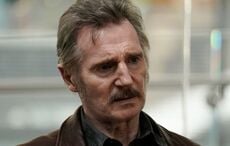Emerging star Jack O’Connell gives a flawless performance as a terrified British soldier lost in West Belfast in ’71, director Yann Demange’s nail biting new thriller set during the height of The Troubles. Cahir O'Doherty talks to Demange about why he picked the North for his debut feature.
Tossed out on the mean streets of Belfast in the middle of a riot in 1971, squaddie Gary Hook (Jack O’Connell) knows his life is immediately on the line. The question is, will he make it out alive or will breakaway IRA hardliners capture and kill him?
If you think you know who you’ll be rooting for here, think again. Director Yann Demange, 37, takes The Troubles as his backdrop, but he doesn’t sell it short for cheap thrills or easy affiliations. What makes his debut feature '71 (opening this Friday in Los Angeles and New York) so compelling is his sympathy for all the players.
In the process Demange has crafted a claustrophobic little trust-no-one thriller that puts the audience right in the heart of a society that’s coming unglued. It’s a totally immersive experience, with handheld cameras making you feel like you’re right there with squaddie Hook as he runs-hides-runs to stay alive on the lethal streets.
For O’Connell, 24, last seen playing the lead in Angelina Jolie’s Unbroken, it’s a descent into a heart of darkness with death literally hovering around every corner.
But what would make a rising British (actually Demange was born French-Algerian but raised in London) director want to tackle The Troubles, even as a backdrop? After all, it can be an invitation for stinging criticism before you’ve filmed your first frame.
“You do have a bit of an eye roll moment, you can’t help yourself,” Demange (fresh from the Oscars after parties) tells the Irish Voice.
“I grew up on this stuff. That’s all the dramas that ever got made on television. There have been a couple of masterpieces in Bloody Sunday and Hunger. And Alan Clark’s Elephant, which I adore, and other great films like Hidden Agenda.
“I had no burning desire to make my own at all. It was just one of those things where the script completely took me by surprise.”
Written by Gregory Burke, whose play Blackwatch about the British Army in Iraq became an international sensation, the script was like a slap to the face, Demange says.
“It resonated with a lot of things I’d been trying to wrestle with in a screenplay I’d written set in Algeria during the civil war. What took me about surprise was how personally I related to the script of ’71,” he says.
Although the period details in '71 are so stark and well designed you feel you've time traveled, there's an undeniably contemporary feel to the questions it asks about human nature.
“It’s so specific to the time yet it transcends that,” Demange agrees. “Burke could be talking about a pattern in human behavior that perpetually repeats itself. It’s happening all over the world right now.”
One of the most extraordinary scenes in the film is when the on the run Hook meets a young Loyalist boy who leads him like a puppy toward the Protestant side of the peace wall.
“We meet this kid who’s putting grown men in their place as he regurgitates all these decades old sectarian hates which have been handed down to him (“They want to kill us all,” he tells Hook, meaning the nearby Nationalists). It was the best piece of writing on the conflict I’ve ever read. It made me decide I’m doing this. I’m going to do this film.”
In some films about the North the violence is seen as yet another factor in the wider political conflict. But in '71 its portrayed as a wrenching individual choice that will scar the person pulling the trigger for life.
“The extinguishing of every life in this film has to matter,” Demange explains. “We were researching the film and I was meeting people there and I realized I can’t take a side. I’m not interested in that. Because all of these classic films about the Troubles exist it gave me a freedom.
“In the Name of the Father has been made, Hidden Agenda has been made. That gave me a freedom to engage in a different way and ask about human beings that are caught up in it. I want to talk about the tribalism, I want to talk about kids who are barely 20 years old being soldiers.”
Killing is not easy. It scars you, Demange insists.
“I didn’t want a Bruce Willis moment where Hook says, ‘Right I’m going to get the guy who got my friend.’ It has to be rough and heartbreaking because it in real life it is.”
Irish people will likely find themselves rooting for this lost, out of his depth working class kid from Derby who like his younger brother was raised in care, an unwanted working class stiff rife for the army.
That sympathy with a fish out of water is part of Demange's strength as a director. That's because when you’re not from a place, you’re placed outside of the ordinary rules of the game, far beyond everyone’s notice. And going unnoticed, you can develop a perspective that isn’t bound up in the usual rules and pieties.
“I couldn’t have asked you to hone in on the theme better,” says Demange. “It’s what gives the film its soul. I could make a contemporary chase movie but why exploit a period in people’s history. It’s got to have a reason to exist.”
Casting O'Connell, whose father was from Co. Kerry, instead of someone like Benedict Cumberbatch or Eddie Redmayne in the lead was a wise choice. O'Connell is a working class kid from Derby who actually wanted to be a soldier himself, which means he brings a rare level of authenticity to the role.
“Jack is an old school dude,” says Demange. “He’s unrefined, he’s a working class kid. He’s not an Australian that grew up on a farm that can do a great working class accent. He just is. He grew up wanting to be a football player and be in the army.”
O'Connell has the kind of raw talent Demange also finds in abundance in Ireland.
“In Ireland there is phenomenal acting talent. The kid (Barry Keoghan) who I found who holds the gun to Hook, he was a terrific actor. You have that talent in Ireland,” Demange said.
It's the claustrophobic atmosphere and the driving soundtrack that carry '71 over the line.
“I wanted it to feel like a hellish landscape. It is a mythic journey, without being too overstated about it,” he says.
“He’s walking through a weird purgatory. When he’s getting stitches on the bed in agony I wanted to treat it like a kind of birthing scene, because that’s when someone speaks the first truths to him.”
Taken in by a kindly father and daughter who find him unconscious and bleeding on the street, he is stitched up by the man who was once a military medic himself.
“I’ve been in the army,” the former medic tells him. “To the army you’re a piece of meat. The army is just posh c***s telling thick c***s to shoot poor c***s.”
It's that kind of bracing line that shows you this is a deeper meditation than the premise might suggest.
“Some people think the film is just handheld realism,” says Demange, who smiles at the idea. The lighting, the soundtrack (by Belfast man David Holmes) and the flawless design say something else entirely.
But it's the darkness of the themes (which include corrupt and sectarian police, the military forces who want to be nonpartisan but can’t be, and the double and triple dealing British security forces who play their friends and foes alike) that suggests a happy ending may be nowhere in sight.
“There’s something about when the sun goes down that taps into this primal fears,” says Demange.
In '71 he takes us in a journey into the heart of Belfast's darkness and asks questions that will never have an easy answer.
’71 will open on Friday at the Angelika Film Center and AMC Lincoln Square in New York.




Comments